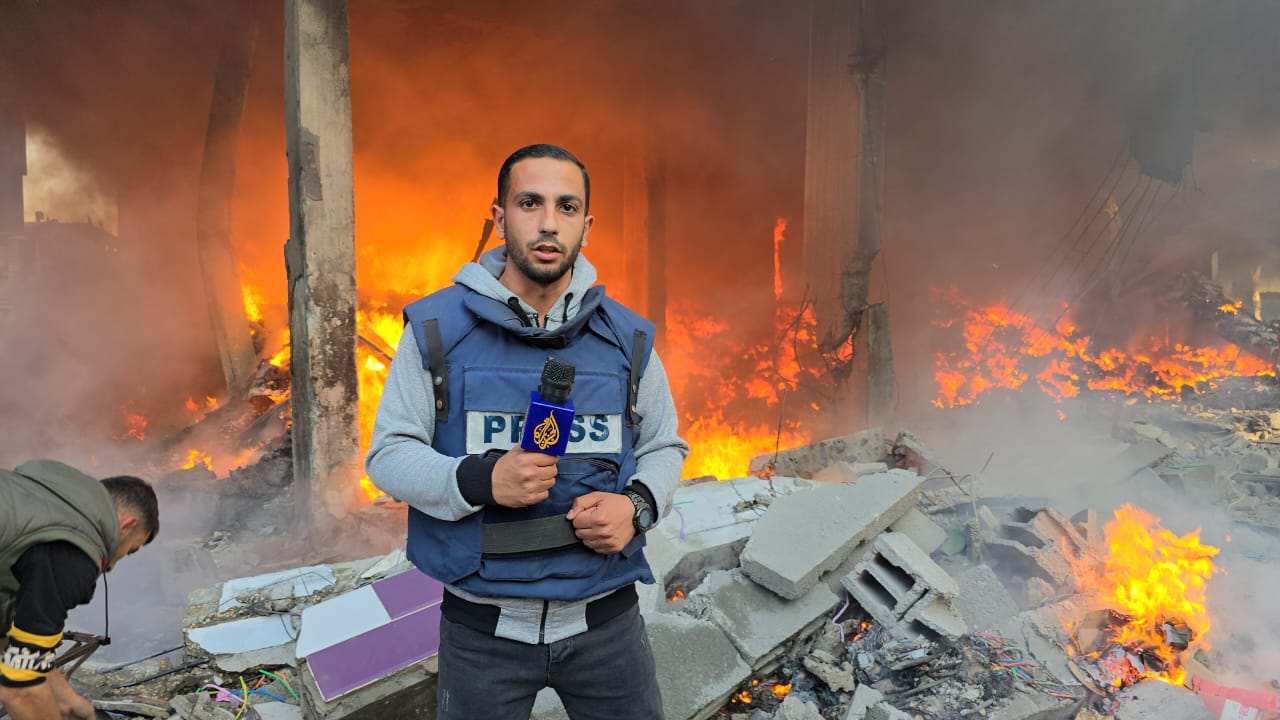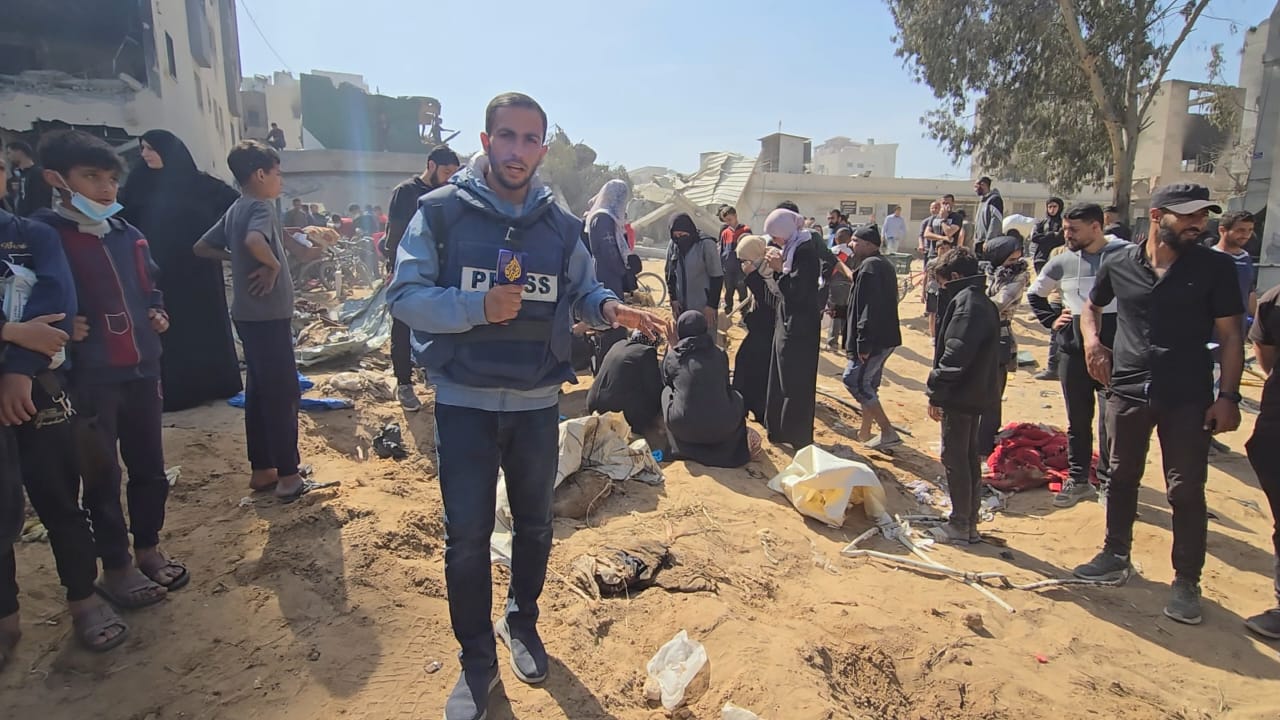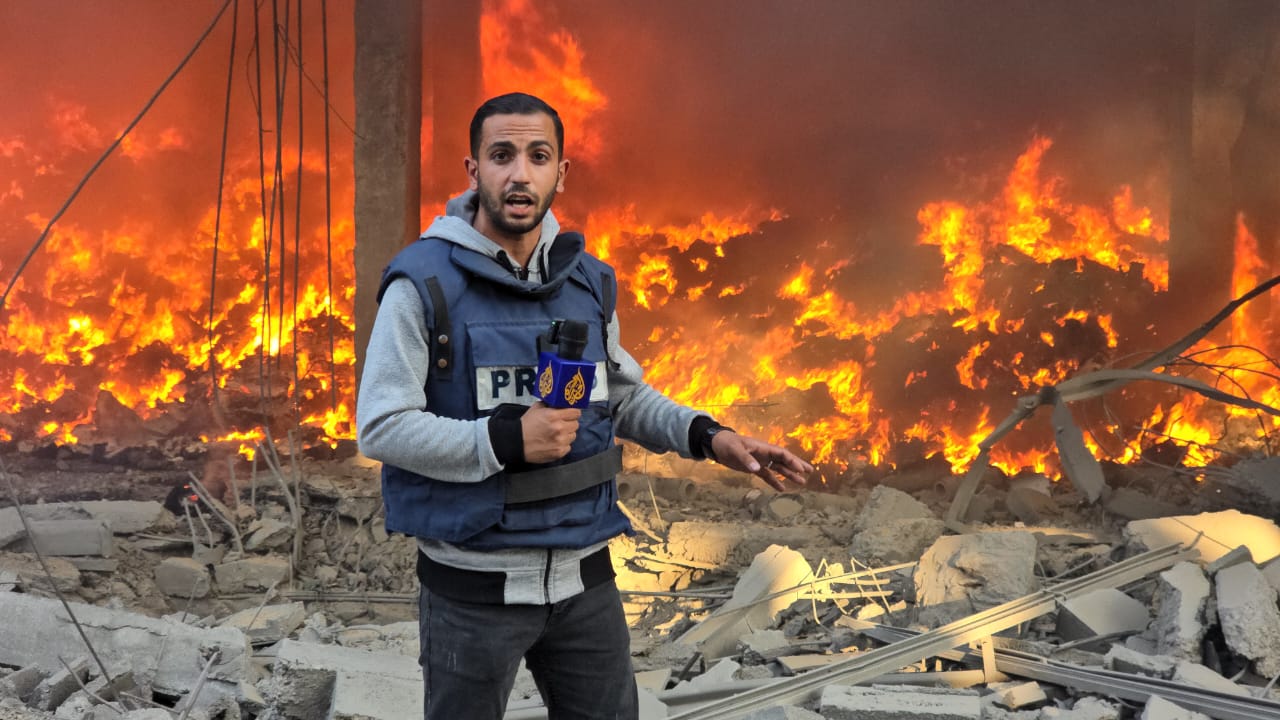حرر المقابلة: محمد أحداد
بدأت القصة بنشر مقاطع مصورة وصور للأماكن التي يستهدفها الاحتلال عبر صفحات منصات التواصل الاجتماعي لتنتهي بتهديد ووعيد بقصف أفراد العائلة. لا تبدو قصة الصحفي الفلسطيني أنس الشريف، الذي أصبح مراسلا لقناة الجزيرة، مختلفة كثيرا عن قصة مئات الصحفيين الفلسطينيين الذين وجدوا أنفسهم، فجأة، يوثقون جرائم الاحتلال المستمرة في قطاع غزة وعموم فلسطين المحتلّة.
رواية فلسطينية بأي ثمن
يروي أنس لمجلة الصحافة قصته مع توثيق جرائم الاحتلال: "منذ السابع من أكتوبر، بدأت بالنشر على صفحاتي الشخصية على منصات التواصل الاجتماعي وعبر وكالات دولية ومحلية وعالمية، والهدف هو إخراج الصورة من شمال غزة أمام الحصار المفروض على دخول الصحفيين الأجانب من طرف الاحتلال، والحقيقة أن هذه الفترة هي التي أسست لالتحاقي بقناة الجزيرة التي كنت أزودها بالفيديوهات والتقارير قبل أن يتواصل معي الزميل تامر الذي قال لي بوضوح: اخرج بتقرير بوجهك وشخصيتك وتحدث وأنهِ التقرير بـ: أنس الشريف لصالح قناة الجزيرة".
انتقل أنس الشريف من توثيق الجرائم على منصاته الرقمية إلى العمل في قناة الجزيرة، التي تعرّض صحفيوها للاستهداف المباشر منذ بداية حرب الإبادة الجماعية. يتذكر أنس الشريف أول تقرير له بُثّ على القناة: "كان لاستهداف في جباليا لمستودعات أخشاب ومواد تنظيف ومواد كيماوية، لقد ظهرت بوجهي، والحقيقة أنها كانت لحظات صعبة وشيئا جديدا علي؛ لأني كنت أعمل خلف الكواليس، أما الآن فأظهر بشخصيتي على أكبر قناة".
لم تخلُ مسيرة أنس الشريف، الذي يُعد من الصحفيين القلائل الذين ظلوا يغطون من شمال غزة، من اصطدام مع الاحتلال الإسرائيلي. "لقد تلقيت عدة اتصالات من قبل الاحتلال على هاتفي الشخصي، ولم أرد عليهم إطلاقا ولم أستجب لرسائلهم. لم يكتفوا بذلك، بل وصلتني تسجيلات صوتية عبر الواتساب من ضابط بالمخابرات الإسرائيلية تدعوني إلى التوقف عن التغطية والانتقال من شمال غزة والتوجه إلى الجنوب، وإلا فسأُستهدَف أنا وعائلتي". بيد أن جواب أنس، الذي تخرج في جامعة الأقصى/ تخصص الإذاعة والتلفزيون، كان واضحا: "أنا وعائلتي لن نغادر من شمال قطاع غزة، ولم نفكر في القرار ولو للحظة واحدة. نحن أبناء مخيم جباليا وعشنا في هذا المخيم، ومرت علينا حروب كثيرة ولم نغادر للحظة واحدة على مدار السنوات السابقة، أما قرار والدي الحاسم فهو عدم المغادرة نهائيا. لقد زادني هذا التهديد إصرارا على مواصلة التغطية".
نفذ الاحتلال وعيده، فاستهدف منزل أنس ومنزل عائلته. "استشهد والدي رحمه الله الذي أصر على البقاء وعدم مغادرة مخيم جباليا رغم التهديدات ورغم كل شيء. هذه ضريبة دفعها كل مواطن يعيش في قطاع غزة، ولا تختلف مأساتي عن ملايين الفلسطينيين، وبعيدا عن المشاعر التي خلفها هذا القتل، لكن أحس أني منتمٍ لهذه القضية ومطوّق بواجب نقل معاناة الفلسطيني إلى العالم".

حماية مفقودة
درجت الأدبيات على تحديد مخاطر ممارسة الصحافة في مناطق الحروب والنزاعات للمساعدة على تحسين جودة التغطية وحماية السلامة الشخصية للصحفيين، لكن ممارسة الصحافة في فلسطين، وفي غزة حيث تستمر حرب الإبادة الجماعية منذ أكثر من ستة أشهر، تبدو تجربة مختلفة؛ ذلك أن الاحتلال في نظر أنس "لم يترك مكانا آمنا في شمال قطاع غزة؛ إذ استهدف المستشفيات التي كنا ننقل منها معاناة الناس، واستهدف المدارس ومراكز الإيواء، والإسعافات... بصيغة أخرى، لم يبق في غزة مكان واحد لاتخاذ تدابير السلامة المتعارف عليها، وما أشعرنا بالمرارة هو غياب حماية الصحفيين سواء من المؤسسات الدولية أو المنظمات المحلية".
لا يريد أنس أن يجيب عن سؤال الحماية الدولية للصحفيين والاعتراف بهم مكتفيا بالقول: "ربما أنا لا أريد أن أجيب عن هذا"، مفسرا هذا الاختزال بأنه "لم تستطع أي مؤسسة دولية أو محلية أو إقليمية حماية الصحفيين في قطاع غزة رغم ارتكاب الاحتلال كثيرا من الجرائم بحقهم واستهدافهم وإطلاق النار عليهم، وما قُدِّم إليهم حتى الآن غير كاف؛ لأن المخاطر عالية جدا، لا تمسهم فقط بل تمس أيضا عائلاتهم".
ورسالة أنس إلى المؤسسات الدولية والمحلية والإقليمية التي تتغنى بالعمل الصحفي وبحماية الصحفيين "أن تنظر إلى الصحفي الفلسطيني الذي يتعرض للخطر الشديد ويتعرض للقصف وللمجازر هو وعائلته، وأن توفر له الحماية؛ لأنه الصوت الأخير لما يجري في غزة الآن".
حسب الأرقام المتوفرة حتى الآن، فإن الاحتلال قتل أكثر من 140 صحفيا؛ أي إن فلسطين أصبحت بيئة غير قابلة للعمل الصحفي، ورغم ذلك فإن أنس يرى أن نقل رواية ما يجري في غزة من الميدان يشعرك "أنك تقدم شيئا إيجابيا للناس في ظل استمرار المجازر والتجويع... عندما أنقل معاناة أحد أبناء غزة أشعر أني قدمت ولو مساهمة بسيطة لقضيتي قبل أن أكون صحفيا. هذه قضيتي منذ أن ولدت هنا في غزة في مخيم جباليا. ومن ثَم فقبل أن أكون صحفيا أنا صاحب قضية أحاول أن أوصلها للعالم".
لا يريد أنس أن يجيب عن سؤال الحماية الدولية للصحفيين والاعتراف بهم مكتفيا بالقول: "ربما أنا لا أريد أن أجيب عن هذا"، مفسرا هذا الاختزال بأنه "لم تستطع أي مؤسسة دولية أو محلية أو إقليمية حماية الصحفيين في قطاع غزة رغم ارتكاب الاحتلال كثيرا من الجرائم بحقهم.
قوة الميدان
في المجال الحيوي للصحفي، أي الميدان، بدأ أنس الشريف عمله الصحفي "مصورا صحفيا، أنقل الأحداث الميدانية من قطاع غزة وبالتحديد من شمال القطاع، سواء الفعاليات الشعبية والمحلية أو فعاليات الفصائل الفلسطينية، وأنقل معاناة أهالي الأسرى وأوثق مسيرات العودة وكسر الحصار على الحدود الشرقية لقطاع غزة. كان عملي كله مقتصرا على التصوير الصحفي، وقد حصلت على جوائز كثيرة تكريما لتغطيتي مسيرات العودة وكسر الحصار".
التحول أو المنعطف الأساسي في المسار المهني حدث يوم هجوم السابع من أكتوبر. "كان الأمر مختلفا تماما في تجربتي المهنية، وما ساعدني هو أني اشتغلت مصورا أجهز المادة ثم أوضبها وأختار زوايا المعالجة. بمعنى آخر، عملت مراسلا ومنتجا ومصورا بالهاتف المحمول".
يحكي أنس عن الساعات الأولى لهجوم السابع من أكتوبر ومدى استعداد الصحفيين للتغطية الميدانية، فما حدث "كان مفاجئا للجميع، وأمام تسارع وتيرة الأحداث لم نجرِ أي ترتيبات كما في الحروب السابقة، والميدان هو الذي فرض علينا شكل التغطية. كنا نتسابق مع الزمن من دون أي ترتيبات سابقة بالنظر إلى الحجم الكبير للمجازر في أماكن مختلفة. وأريد أن أشير هنا إلى أنه مع تطور الأحداث تحسنت التغطية الميدانية وأصبحنا نركز على المجازر رغم قسوة ما نراه".
تختلف تجربة التغطية الصحفية في غزة عن بقية مناطق الحروب؛ فطيلة أكثر من 6 أشهر من حرب الإبادة الجماعية، أبلغ الصحفيون عن تحديات استثنائية تتمثل في انعدام الخدمات وانقطاع الكهرباء والاتصالات. يتحدى أنس الشريف هذه الظروف قائلا: "لم أتوقف لحظة عن التغطية، كنت أتنقل فوق أسطح المنازل والمستشفيات بحثا عن إشارة الإنترنت مع ما يرافق ذلك من مخاطر، بالنظر إلى استهدافنا المباشر. بعد أربع ساعات من الانتظار والمحنة، يُرسَل التقرير بعد أن مضى وقت على المجازر، لكن هاجسي أن يظل صوت الشمال حاضرا. والحال أني في لحظات معينة أصبحت غير قادر على إجراء اتصالات مباشرة مكتفيا بتسجيلات صوتية فقط".
محنة أنس مع التغطية الصحفية في غزة هي اختصار لمحنة الصحفيين القلائل الذين ظلوا في الشمال "مخاطرين بأنفسنا، مستخدمين الشرائح الإلكترونية حتى ولو كانت تنطوي على الخطر؛ فالأهم أن تظل صورة الميدان حاضرة".

التضامن بين الصحفيين كان خط الدفاع الأخير للحفاظ على قيمة الصحافة، كما يروي أنس "فكنا إخوة لبعضنا، نتنقل من مكان إلى آخر جميعا، نوثق جرائم الاحتلال من زوايا مختلفة. لقد بينت التجربة أن الاحتلال يقصف الصحفيين بشكل متعمد؛ فعلى سبيل المثال وبينما كان الزميل محمد عرب يوثق الدمار في منطقة تل الزعتر في محيط المستشفى الإندونيسي أطلقت الطائرات الحربية ثلاثة صواريخ بشكل مباشر في اتجاه الصحفيين".
كنا محتارين في البداية، هل ننشر هذه المقابلة على الطريقة التقليدية محكومة بالسؤال أو الجواب أو نجعلها تنقل عفوية الأجوبة، فاستقر القرار على الخيار الثاني، لكن رسالة أنس الأخيرة، نتركها كما هي من دون تحرير أو ترتيب:
"لقد وثقت كثيرا من المجازر والقصف والمنازل التي تهدمت على رؤوس ساكنيها والمجازر الكبرى التي وصل عدد شهدائها إلى المئات، لكن لم يؤلمني ذلك أكثر من فترة المجاعة التي مرت على شمال قطاع غزة. الناس هنا تحملت المجازر و دماء الشهداء، وصبرت على الفراق وعلى كل شيء، لكنها لم تتحمل المجاعة وصراخ الأطفال في الليل والأهالي يتجولون ويتنقلون من مكان إلى آخر وهم يناشدون العالم من أجل وجبة طعام واحدة ليوم واحد لأطفالهم. عانيت من ذلك شخصيا. يعني ما كنا نلاقي خبز ولا رز ولا معلبات، يعني تمر أيام لا نستطيع أن نوفر وجبة طعام واحدة. ورغم ذلك قاومنا بقدر ما نستطيع، واستمررنا في التغطية لآخر لحظة ولآخر نفس".


















![Palestinian journalists attempt to connect to the internet using their phones in Rafah on the southern Gaza Strip. [Said Khatib/AFP]](/sites/default/files/ajr/2025/34962UB-highres-1705225575%20Large.jpeg)





















